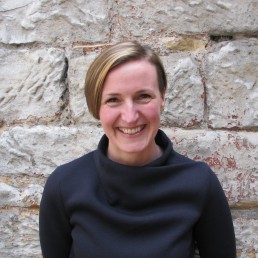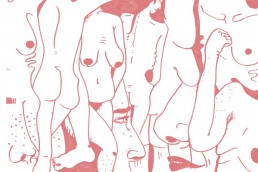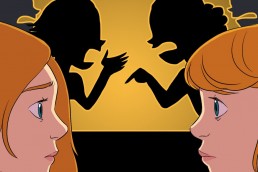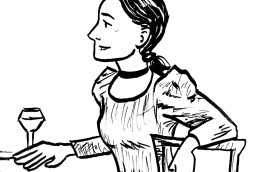By Heather Pearson
Illustration by Ida Henrich
Once upon a time there was a woman. The woman worked at a magazine and she wanted to write about body image, she wanted specifically to write about body image in an impactful way, some might say a way that kept the word count down and the busy Art Editor happy, while typesetting.
One morning, the woman thought that, perhaps, the best thing to do would be to write just one sentence; just five – or maybe ten – near perfect words.
Words to set both tone and pace, words providing a punctuation point in a magazine’s offerings that would be immediately comforting and challenging, subversive and humorous, inspiring and affirming. Words to sucker punch the heart.
The woman wandered in the thick, honeyed porridge of possibilities; contemplating, searching her mind then her screens; peering into memories and memes, running her mental gaze over images and thoughts, plucking phrases up into the light of her pre-frontal cortex and examining the bones of them to see where they were best filled with meaning instead of marrow.
The woman thought a lot about how body image was so often grafted onto people seeing themselves and others as either good or bad; about how slimness and lithe muscularity were associated with virtue and achievement, about how curves and flesh meant deleted respect for the person they were part of.
She thought, then, maybe these were the words:
THERE IS NO FOOD YOU CAN
PUT IN YOUR MOUTH THAT
MAKES YOU GOOD OR BAD
And it seemed to sum things up quite well.
Then, wandering still, the woman thought about scars and how they too attracted ideas of ownership over bodies in public. She thought about how scars on show often invited conversation. On one hand this was good, the woman recalled; sometimes scars brought together shared experiences and empathy, she’d seen it herself when her son bobbed to the edge of a swimming pool one Maltese October and a group of men in their 70s had swum over, a golden crucifix at the neck of the ambassador whose freckled fingers traced the top of fifty centimeters of scar, a trailing ivy tendril from the nape of her Manchild’s neck, the curious elder’s fingers stopping where water lapped skin between shoulder blades, though the ivy searched down and down, into the blurry blue. The woman had watched them, gentle ape-like in their pack as she’d made her way across the water to claim her child’s gaze and judge his view on consent and violation in a bath of good intention. When he nodded an OK, lifting himself to the side of the pool so they could see more, between them his body had created an ephemeral community.
Other times though, the woman knew, scars brought the isolation of a stare and suspicion, rather than concern; as if skin made new implied threat, as if cuts on wrists next to bangles were the same as Chelsea Grins in what they might infer about public safety and personal history. As if a lack of public safety and love were not the missing things that caused so many non-surgical scars anyway.
The woman thought a lot then about how scarred bodies were like women’s bodies at swimming pools and everywhere; that long stares on other people’s skin spoke of entitlement. That if a woman dressed up she was asking for it and if a woman dressed down, she was too modest and not celebratory enough. And if a woman dressed just right, like a Princess of a modern monarchy, her opinions were swapped for safe hemlines, like the mermaid Princess’s voice had been swapped for legs.
The woman thought then, that what she wanted to be true and always wrapped in a loving ribbon about fat bodies and bone-revealing bodies and scarred bodies, and all bodies, were the words;
YOUR BODY, YOUR BUSINESS
Trying them in her mouth, the woman considered that all words conveying judgment should be dropped, permission should always be given and respect should be a default. Then the woman thought of how black and brown bodies were often treated with disrespect, or dehumanized altogether. She thought about disabled bodies often navigating the tracks between the shared business of personal care and dignity, too; colossal efforts under-recognised and considered.
And so, the woman concluded, her privilege was pushing up against her desires and those words were not quite right either.
The next day, the woman flicked through the book she was reading and let it lead her fingers to her keyboard, searching still, then, settling at where she should’ve begun: deeper knowing. Among a poem, at the end of the first stanza, she found the words that were not too hot and not too cold, neither too small nor too big; words strong enough to hold her weight and shape and thoughts and the weight and shape and thoughts of all intentions…
Words that were just right.
my body
writes into your flesh
the poem
you make of me
Audre Lorde, “Recreation” from
The Collected Poems of Audre Lorde, © 1997
Inhaling deeply then exhaling with the peace that good words always bring, the woman, believing in consent as well as content, did not climb into anyone’s bed without permission and fall asleep. Instead, she basked in the comfort of another woman’s wisdom.
And then she filed her copy.
The End
Heather Pearson
Heather Pearson is based in Edinburgh and, through poems, prose and commentary, tells stories about womanhood, place, identity and change.







